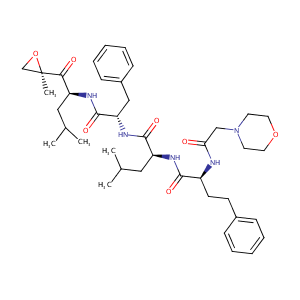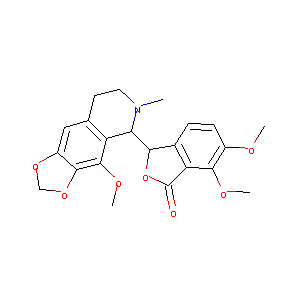| 1 |
Recurrent recessive mutation in deoxyguanosine kinase causes idiopathic noncirrhotic portal hypertension.Hepatology. 2016 Jun;63(6):1977-86. doi: 10.1002/hep.28499. Epub 2016 Mar 31.
|
| 2 |
URL: http://www.guidetopharmacology.org Nucleic Acids Res. 2015 Oct 12. pii: gkv1037. The IUPHAR/BPS Guide to PHARMACOLOGY in 2016: towards curated quantitative interactions between 1300 protein targets and 6000 ligands. (Ligand id: 7420).
|
| 3 |
Carfilzomib FDA Label
|
| 4 |
Clinical pipeline report, company report or official report of the Pharmaceutical Research and Manufacturers of America (PhRMA)
|
| 5 |
ClinicalTrials.gov (NCT00912899) A Study of Noscapine HCl (CB3304 ) in Patients With Relapsed or Refractory Multiple Myeloma. U.S. National Institutes of Health.
|
| 6 |
The Zinc-Finger AN1-Type Domain 2a Gene Acts as a Regulator of Cell Survival in Human Melanoma: Role of E3-Ligase cIAP2. Mol Cancer Res. 2019 Dec;17(12):2444-2456. doi: 10.1158/1541-7786.MCR-19-0243. Epub 2019 Sep 20.
|
| 7 |
Nat Rev Drug Discov. 2013 Feb;12(2):87-90.
|
| 8 |
Identification of an ABCB1 (P-glycoprotein)-positive carfilzomib-resistant myeloma subpopulation by the pluripotent stem cell fluorescent dye CDy1. Am J Hematol. 2013 Apr;88(4):265-72.
|
| 9 |
Identification and Profiling of Environmental Chemicals That Inhibit the TGF/SMAD Signaling Pathway. Chem Res Toxicol. 2019 Dec 16;32(12):2433-2444. doi: 10.1021/acs.chemrestox.9b00228. Epub 2019 Nov 11.
|
| 10 |
Identification of Compounds That Inhibit Estrogen-Related Receptor Alpha Signaling Using High-Throughput Screening Assays. Molecules. 2019 Feb 27;24(5):841. doi: 10.3390/molecules24050841.
|
| 11 |
Cannabinoids synergize with carfilzomib, reducing multiple myeloma cells viability and migration. Oncotarget. 2016 Nov 22;7(47):77543-77557. doi: 10.18632/oncotarget.12721.
|
| 12 |
Suppression of BRCA1 sensitizes cells to proteasome inhibitors. Cell Death Dis. 2014 Dec 18;5(12):e1580. doi: 10.1038/cddis.2014.537.
|
|
|
|
|
|
|


